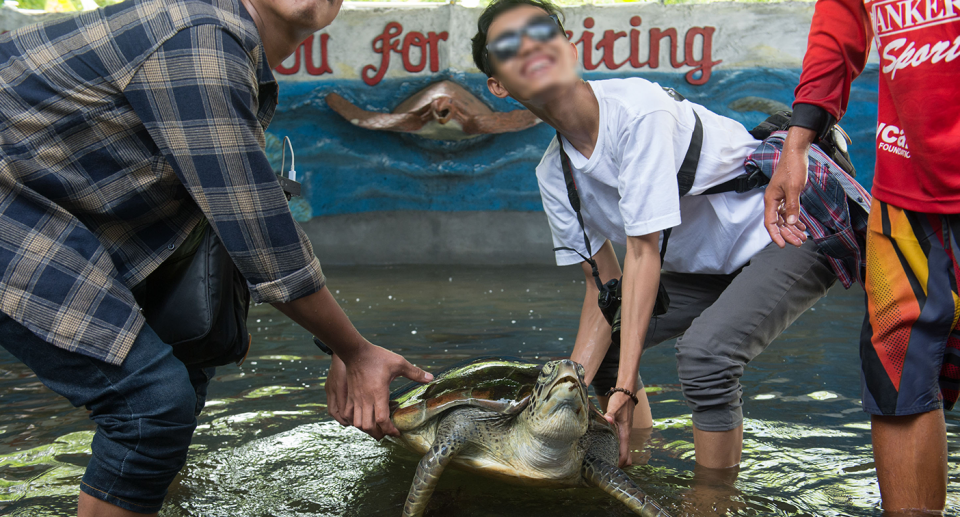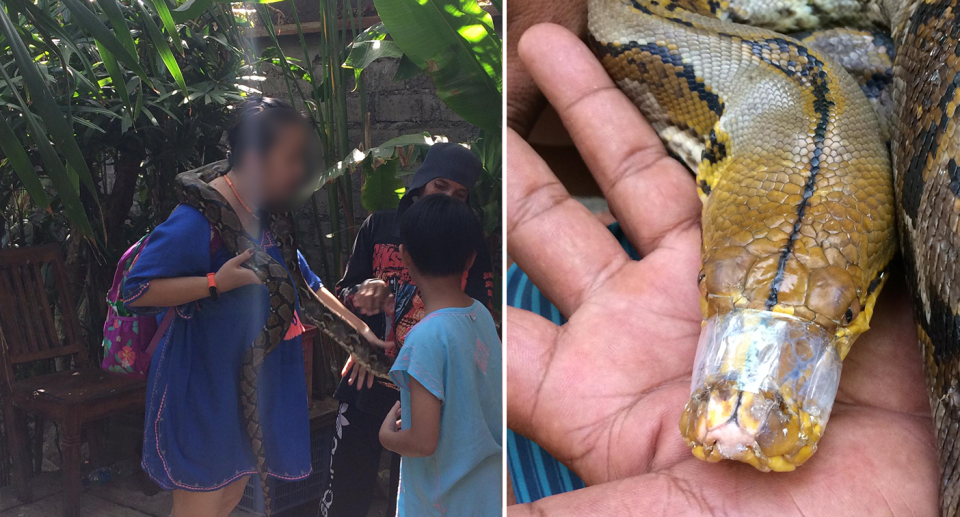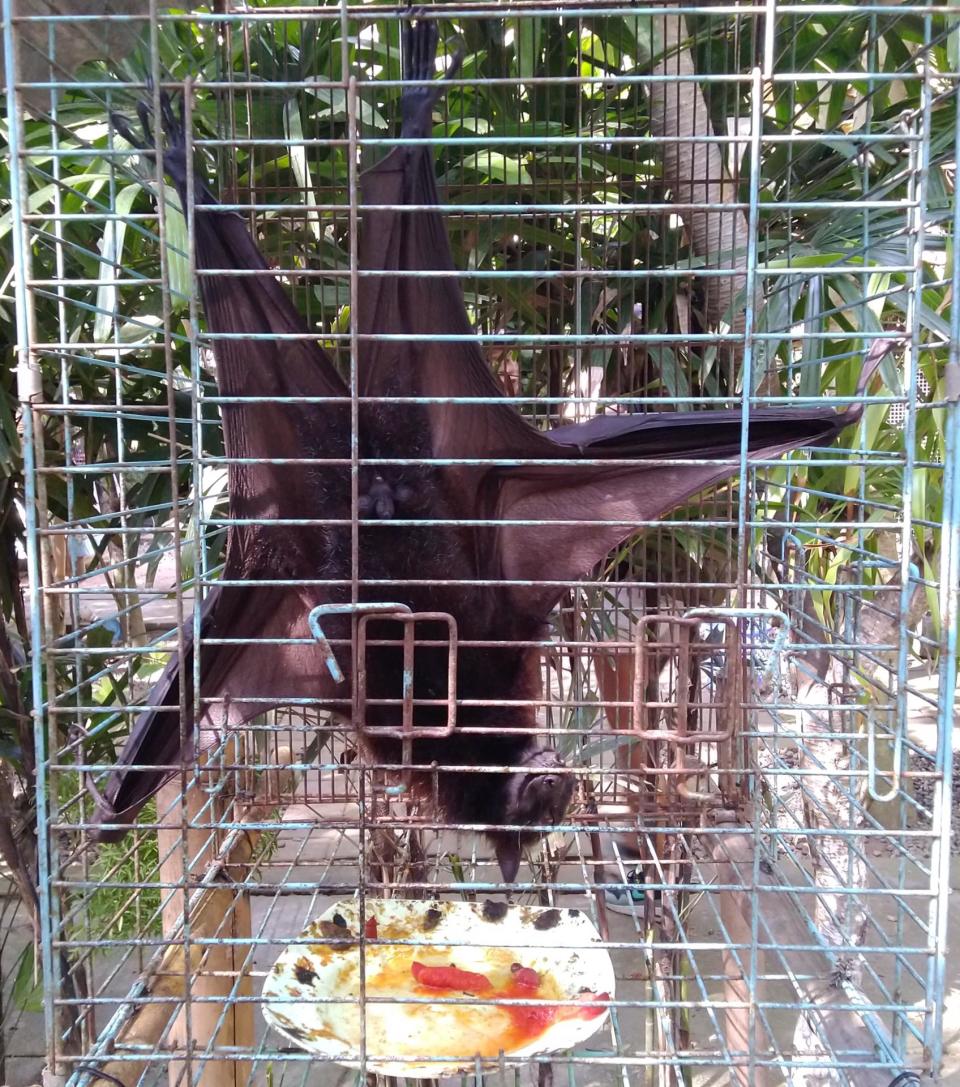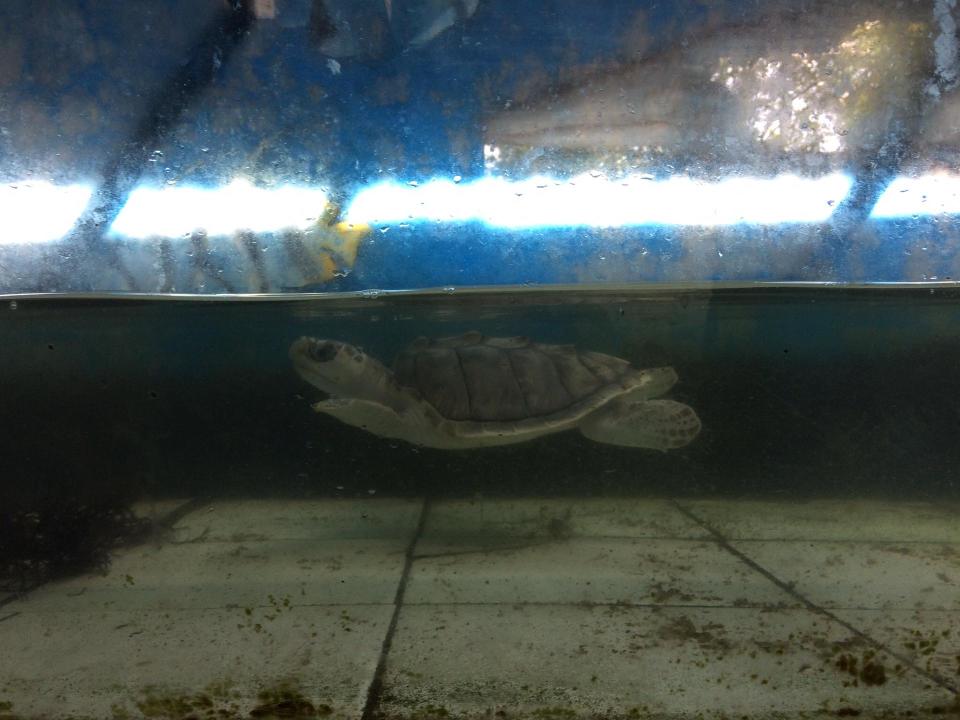Selfies, sacrifice and 'special menus': Calls to close rogue turtle tourist parks
Shocking photos show endangered Balinese animals confined in tiny cages and ponds so tourists can take selfies with them.
Tripadvisor no longer lists the six so-called sea turtle farms individually, however a collective review on the site of Tanjung Benoa’s turtle farms is scathing as Australian tourist lament the conditions of the wild animals.
The zoos, five kilometres south of Kuta, have a 65 per cent terrible rating with review headlines including ‘Terrifying!!!”, ‘Don’t go here’ and ‘Animal Jail’.
Green sea turtles can live for up to 80 years and will not breed in captivity, which indicates the endangered animals are captured from the wild.
Although naturally solitary animals, the reptiles are grouped together in shallow pools so visitors can handle them.


Femke den Haas from non-profit Jakarta Animal Aid Network (JAAN) documented what she calls the “shocking” conditions inside the farms.
“It’s dirty and quite miserable for the sea turtles in shallow water,” she told Yahoo News Australia. “Many of them are actively stressing, moving around and trying to find a way out.”
Whilst visiting the farms in May this year, den Haas witnessed a menagerie of wild animals confined in tiny, bare, steel cages, designed for one thing only: easy access for tourists.
“They have a python and they’ve tied its mouth with tape to avoid people being bitten or being scared of the snake,” Ms den Haas said.
“The only reason these centres exist is because people go there to take photos with these animals. Tourists go there and they hug them and have their selfies taken with them.”


A 2018 report compiled by World Animal Protection (WAP) quoted an estimate from turtle park staff that between 200 and 500 people visit each day to handle them.
WAP documented cases of inexperienced tourists dropping turtles and found no evidence that the farms had any conservation value. They fear that the pens are harbours of disease that could harm not only the wild turtle population, but also tourists who pick them up.
‘Unethical practices’: government to reform farms
Indonesian government officials have been meeting with the community organisation that oversees the farms, called Koperasi Desa Adat Tanjung Benoa (KDATB).
Permana Yudiarso from the Indonesian Ministry of Marine Affairs and Fisheries (MMAF) told Yahoo News Australia that three of the six farms are currently operating without government permits.
Following a June 16 report into practices at the farms, officials returned to find signage informing visitors that touching the turtles was prohibited - but the regulations were not being enforced.
“We found unethical practices - some tourists still touch them,” he said. “Some visitors were still feeding them, but it’s not allowed actually,” Mr Yudiarso said.

Inspectors found the farms collectively hold more than 300 turtles of which 230 are endangered green sea turtles.
Despite initial calls for the farms to be shut down, Mr Yudiarso said closing the farms would be “controversial” and that a number of local and federal government agencies are working to “rearrange” the tourist attractions.
Mr Yudiarso hopes that with regular reporting, enforcement and the involvement of vets, the parks can continue to supply much needed employment, whilst improving conditions for the animals.
‘Special menu’: blackmarket turtle trade
Despite their vulnerability, there is a thriving black market that trades in sea turtles as a traditional meat.
Sources say they are sold as part of a “special menu”.

“Demand of green turtles for consumption is high in Bali, even though it is illegal,” Mr Yudiarso said.
On Thursday night, 13 green sea turtles were intercepted by police in Jembrana, west Bali, and MMAF have been called in to investigate.
Police interceptions of turtles destined for the dinner pot are common in Bali.
‘I want to be a professional’
Leader of KDATB which oversees the parks, I Made Berata, said the Benoan turtle farms were originally started to transition employment jobs from killing turtles to providing tourist experiences.
“I know that there are still weaknesses of the turtle farms, for example animal welfare, because they have no knowledge for that,” he told Yahoo News Australia.
“I talk with the government how to make a professional turtle farm ... I talk with the animal group to say how we should treat the turtle - we have to change, you know.”

Mr Berata is hopeful that the Indonesian Department of Forestry will provide necessary licenses, so they can work with government and animal welfare groups to transfer the farms into more environmentally conscious eco-tourism parks.
“Many people complained about the turtle farm, that’s why we’d like to improve,” he said.
Mr Berata said that following the government inspection the tape was removed from the python’s mouth and they are working to improve welfare.
He argues that while farm operators are trying to comply with new regulations, tourists don’t always listen.
“It’s sometimes difficult with the tourists, especially from the Chinese,” he said.
“I want to be a professional to treat the turtle well, you know.”


Regulation of animal sacrifice
As well as being prized for their meat, sea turtles are also traditionally used in Hindu ceremonies where they are ritually slaughtered and buried.
Mr Berata hopes animal sacrifice could be regulated through the farms and better records kept to help maintain turtle populations in the wild.
“Especially for Hindu people they need a turtle, but not every day,” he said.
“I want to know in Bali how many turtles they need for the ceremonies and not for meat.
“With good management in the turtle farms, all of the things can be notarised. So if someone needs a turtle they need to make a letter - I want like that, you know.”
The Indonesian government is yet to decide whether it will provide licenses for the remaining turtle parks. JAAN and WAP continue to urge tourists not to support the businesses.
Do you have a story tip? Email: newsroomau@yahoonews.com.
You can also follow us on Facebook and Twitter, download the Yahoo News app from the App Store or Google Play and stay up to date with the latest news with Yahoo’s daily newsletter. Sign up here.



